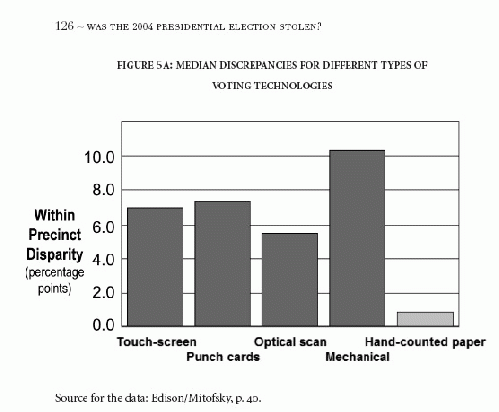These results are a stark warning of how difficult it is to implement new voting technologies. People worked hard to develop these new technologies. Election officials carefully evaluated the systems, with increasing attentiveness over the last decade. The result: our best efforts applying computer technology have decreased the accuracy of elections, to the point where the true outcomes of many races are unknowable.
We are a technological society. Technology has become part of our religion. And like other religious, some stop along the path to seek answers, to question, to revisit, while others just go on faith. It’s not my place to say what role critical thought and science should play in religion, but America is not supposed to be a religious society. It is time to revisit faith based voting. If a computer is counting your vote, there is simply no way for human beings to observe the count. If the count is being done by a machine- whether it’s a DRE or an OpScan- it is a secret count and we’re all going on faith that our vote was counted as cast. That’s not good enough for a country which was founded on a separation of church and state and whose founding documents jealously guard against the surrender of our rights. Our right to know that are votes were accurately counted is the right on which all others hinge. When we stop and think and question we see this:
(See Paul Lehto’s New York City Change To Optical Scan Elections: Not the answer, but getting closer).
It’s not easy to give up our machines, but what if it’s true that: “our best efforts applying computer technology have decreased the accuracy of elections, to the point where the true outcomes of many races are unknowable.” None of us should be willing to accept not knowing the outcomes of our elections because we choose machines over doing it ourselves. No one would voluntarily surrender the right of the people to control their ability to choose their representatives and yet, we hold onto our machines.
So Doug’s willingness to publicly say he’s torn after 14 years of fighting for a paper trail really moved me. I can understand that feeling. I don’t understand Ralph Neas. Neas, by the way was responding to Brad Freeman’s interview with Kennedy the week before. Brad’s powerful story about these interviews and his struggle to deal with his allies is at http://www.bradblog.com/?p=4299.
Brad focuses on the irrationality of Holt II and the groups who seem to be blindly supporting the Legislation, holding onto these DREs notwithstanding everything we now know. But not to let the dreaded DREs distract from other aspects of Holt’s Bill which are particularly frightening, see Bev Harris’s, What's Wrong with Holt II (HR 811) and Nancy Tobi’s New Version of Holt Bill: A Giant Step Backwards in which she discusses the unfunded mandates contained in the Holt Bill as well as the expansion of executive power. Lost amidst the discussion about DREs is the power this piece of Legislation hands over to the executive, of all branches!. Holt’s Bill would make the shamefully scandal ridden Election Assistance Commission (EAC) a permanent fixture.
Speaking of the EAC…………….
Who is Doug Lewis?
This is where I went when I got Doug’s email commenting on Doug Lewis’ testimony. Take a look at Lewis’s testimony and then those of you who don’t know will fairly quickly ask yourselves - who is Doug Lewis? A question that many have asked before.
Doug Lewis, as you will see in his testimony, wants to maintain the status quo: hackable machines/nobody paying any attention. He is critical of Holt’s Bill because it might apply some scrutiny to Doug Lewis and his friends, see below. Congressman Holt, like Doug Lewis also wants to hang onto these hackable machines. He just thinks if we throw enough money at them (unfunded in his Bill) they can be improved. If improved gets you to still can’t observe the counting of your vote, what good is it?
Next Page 1 | 2 | 3 | 4 | 5 | 6 | 7
(Note: You can view every article as one long page if you sign up as an Advocate Member, or higher).





